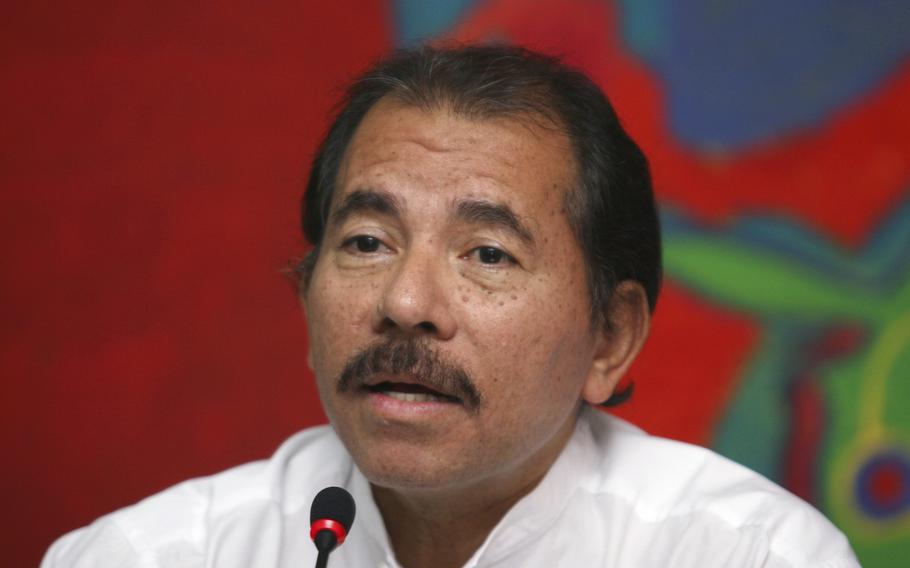
Daniel Ortega talks during a meeting in Nicaragua in 2007. (Susana Gonzalez/Bloomberg)
Nicaragua's dictatorial government freed 222 political prisoners Thursday, including top opposition politicians and business leaders, and sent them to the United States in a surprise twist in one of Latin America's grimmest human rights sagas.
The Biden administration said in a note to Congress that the government of President Daniel Ortega "decided unilaterally" to release the prisoners. The U.S. government "facilitated their transportation and entry into the United States," the note said. The detainees were freed from Nicaraguan prisons at dawn Thursday, according to family members, and bused to Managua's airport, where they boarded a charter plane bound for Washington. They landed at Dulles International Airport shortly before noon.
Javier Álvarez, 68, heard Thursday morning from Nicaraguan activists that his wife, Jeannine, daughter Ana Carolina and son-in-law Felix Roig were among the freed prisoners. "Happy, happy, happy," was his reaction, in a telephone interview. "This was totally unexpected. But it seems there were secret talks, and they managed this."
The prisoners had endured some of the harshest conditions in any jails in Latin America, according to their families. They were denied visits with relatives and their children for months. Many were not permitted to have books or writing materials; one was reduced to reading the label on a tube of toothpaste, family members said. The prisoners had little access to sun or fresh air. Some lost weight and became gaunt.
One prisoner, Hugo Torres, 73, died in captivity.
Several of the prisoners had planned to run against Ortega in 2021 elections. But they were detained before the balloting, and Ortega cruised to a fourth consecutive term.
Nicaragua's Judicial Council confirmed Thursday that the 222 prisoners were deported, saying they had been declared "traitors to the nation" and would be permanently deprived of their political rights, such as holding public office. The National Assembly later passed a measure stripping them of their nationality, according to local media reports.
The freed prisoners included some of Nicaragua's best-known opposition politicians, according to family members and activists. Among them were Cristiana Chamorro, the daughter of former president Violeta Chamorro. Cristiana Chamorro had been under house arrest. Her cousin, Juan Sebastián Chamorro, was also released, as was another former presidential candidate, Félix Maradiaga.
Students who helped lead nationwide anti-government protests in 2018 were also on the flight to Washington. "Our friends have been freed," exulted the Nicaraguan University Alliance in a tweet. It said they included student leaders Lesther Alemán, Max Jerez, Mildred Rayo and Miguel Flores.
Michael Healy, 61, a U.S.-Nicaraguan dual citizen and the former head of Nicaragua's top business council, was also freed. He was jailed in October 2021 on allegations of money laundering and terrorism, charges that his friends and family called spurious.
A senior Biden administration official said all of the prisoners who were released and left Nicaragua consented to travel and that the U.S. government made medical and legal assistance available. The official added that each person who entered the United States was screened and vetted, including by the FBI, and would be screened again by U.S. Customs and Border Protection upon arrival "as is standard for those seeking humanitarian parole."
The official said the United States has long called for the release of the political prisoners "as a first step toward the restoration of democracy and an improved human rights climate in Nicaragua."
"The decision of the Nicaraguan government is a positive and welcome one," the official said. "We remain steadfast in encouraging additional steps by the government of Nicaragua to restore civil liberties and democracy for the Nicaraguan people."
Ortega was a major figure in the Sandinista revolution that triumphed in 1979, and he was one of the early leaders of the Marxist government that replaced dictator Anastasio Somoza. He went on to lead Nicaragua's government but lost a presidential election in 1990. After returning to power in 2007, he steadily tightened his grip over Nicaragua's judiciary, legislature and electoral machinery.
Since crushing a nationwide anti-government uprising in 2018, he has led a wave of repression. Nearly all of his political opponents were jailed, as were leaders of the business community, human rights activists and even Catholic priests. The government has shut down independent media outlets and around 3,000 nongovernmental organizations.
Recently, the government even started jailing family members of its perceived opponents. In September, police attempted to arrest Álvarez, who had been assisting the families of political prisoners. But he had already fled. So security forces detained his wife, daughter and son-in-law, even though they were not involved in political activity, Álvarez said. Last month, they were sentenced to long prison terms.
The Washington Post's Gabriela Rodriguez in Mexico City and Yasmeen Abutaleb in Washington contributed to this report.